Google +? Have you forgotten about it, too? While many of you seem to have been disregarding Google + over the past few years, it was there. But now, as the latest news confirms, we’ve found out that it will be shut down after user information was exposed. It is no shock for some to hear that it will be locked down, while for others it is sad news.
All in all, the news might affect lots of business owners. We’ve talked on our blog before, on multiple occasions, about the effect of social signals for your website. Now, it is time to see what has actually happened and what’s next.
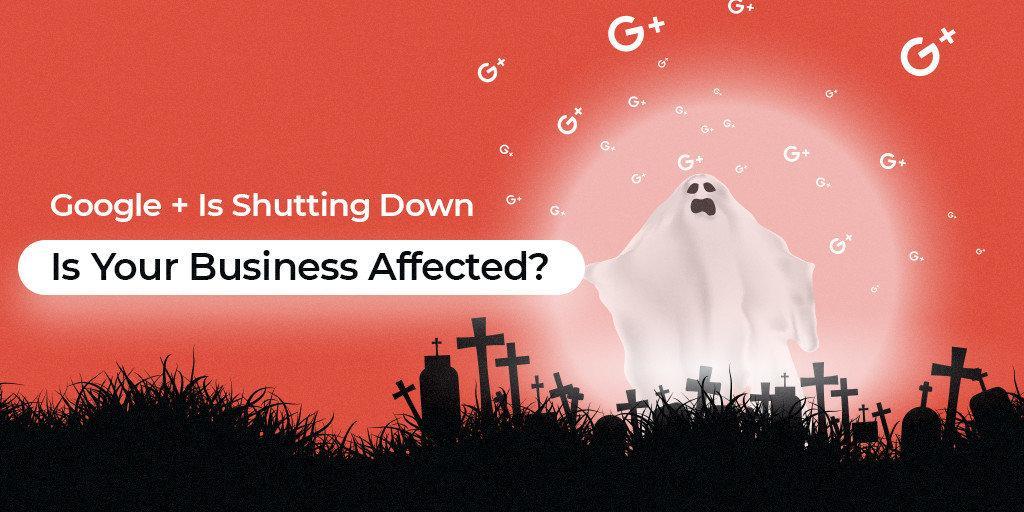
All the fuss was powered by the news saying that Google + will be shut down after user data leak. Sources say over 500,000 users are affected because Google had leaked private information to third-party app developers between 2015 and March 2018. Google did not tell about the security breach they had in March 2018 and that came backstabbing them.
The problem is even more serious if we recall the similar situation that happened earlier this year, when Facebook acknowledged that Cambridge Analytica, a British research organization that had performed work for the Trump campaign, had inadequately got access to the personal information of up to 87 million Facebook users.
- How Google’s Officials Treat the News
- Will Shutting Down Google + Affect Your Business?
- What’s Next in Your Social Media Strategy
1. How Google’s Officials Treated the News
The decision to stay quiet drew the attention of the cybersecurity community because the laws in California and Europe say a company must disclose a security episode.
On the other hand, Google’s decision to stay quiet was taken because it didn’t interfere with the company’s “Privacy & Data Protection Office” and it was not legal to report it. The giant mentioned in a blog post that nobody gained access to user information.
| We found no evidence that any developer was aware of this bug, or abusing the API, and we found no evidence that any Profile data was misused. | |
Applications made by other companies had access to Profile fields that were shared with the user, but not marked as public. Google’s officials said that:
| This data is limited to static, optional Google+ Profile fields including name, email address, occupation, gender and age. It does not include any other data you may have posted or connected to Google+ or any other service, like Google+ posts, messages, Google account data, phone numbers or G Suite content. | |
So apps did not have access to phone numbers, messages, Google Plus posts or data from other Google accounts. And they didn’t find any evidence that outside developers found the breach and the issue was fixed in March.
The funny thing in this situation is the fact that Google’s top managers stopped posting on Google + up to 3 years ago, in 2015. Which is kind of strange, because a Wall Street Journal report showed Google exposed user data around that date, as mentioned previously.
Larry Page, the co-founder of Google, had his last post on 21 August 2015, as you can see in the next screenshot. It seems like he gave up on Google + a long time ago.
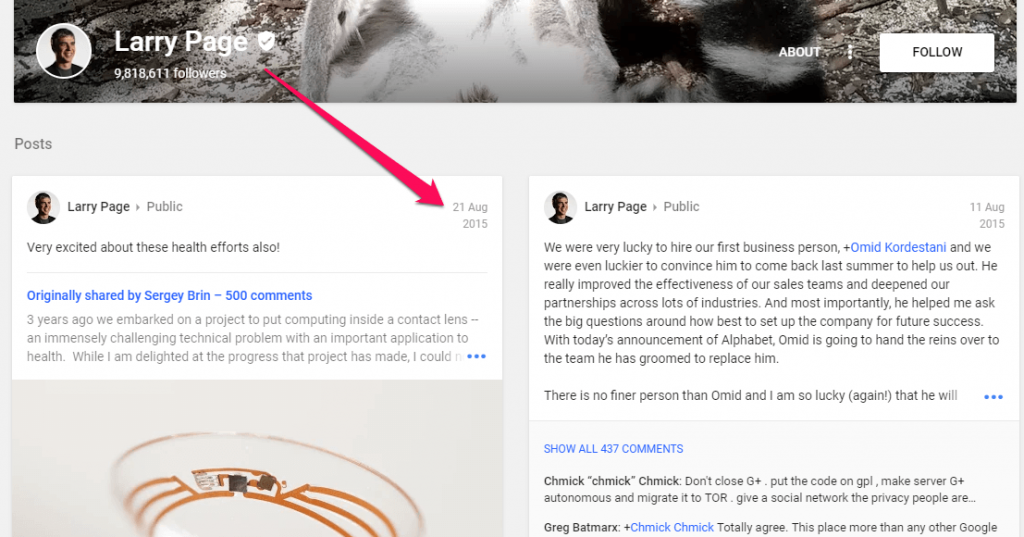
Since 30 June 2011, Larry had posted 147 times on his Google plus account. And that’s so little! If you take into consideration that until 2015 (when his last post was made) he had 147 posts, we could make a large assumption and say it’s like he posted 3 times per month.
Let’s take a look at the second co-founder, Sergey Brin’s Google + page. His last post isn’t published so long ago – on 9 September 2017. From all Google management, he’s the one that used Google + for a longer time. His last post was a photo within the Ragged Islands in the Bahamas, made just a few hours before it bore the brunt of Hurricane Irma.
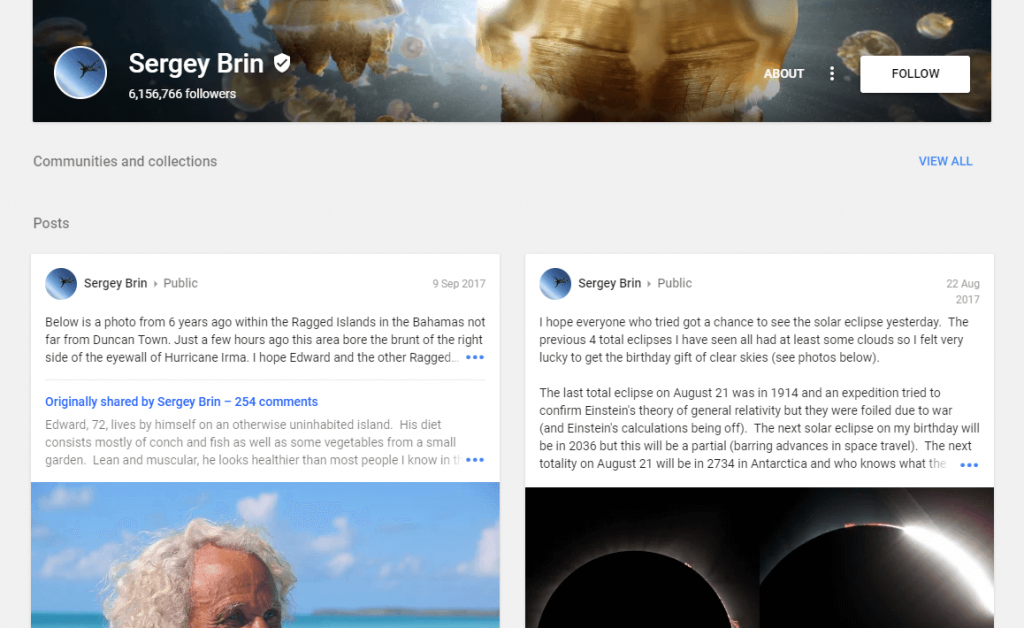
A few years ago, Sergey Brin said that he is not a very social person and hadn’t spent much time on Facebook and Twitter, Google +’s competition. We discovered that more recently he lost his Twitter account (@sergeybrinn – is a suspended account). There are some voices that say he had a secret personal Facebook page, but we couldn’t find it. There are a lot of fake accounts instead.
Although he expressly said he’s not more of a social person, he is the one that used Google plus the most from all Google’s officials.
Sundar Pichai, the CEO of Google, last posted on 9 March 2016 about Google’s Deep Mind challenge. He was the second one who gave up on Google +, after Parry Page.
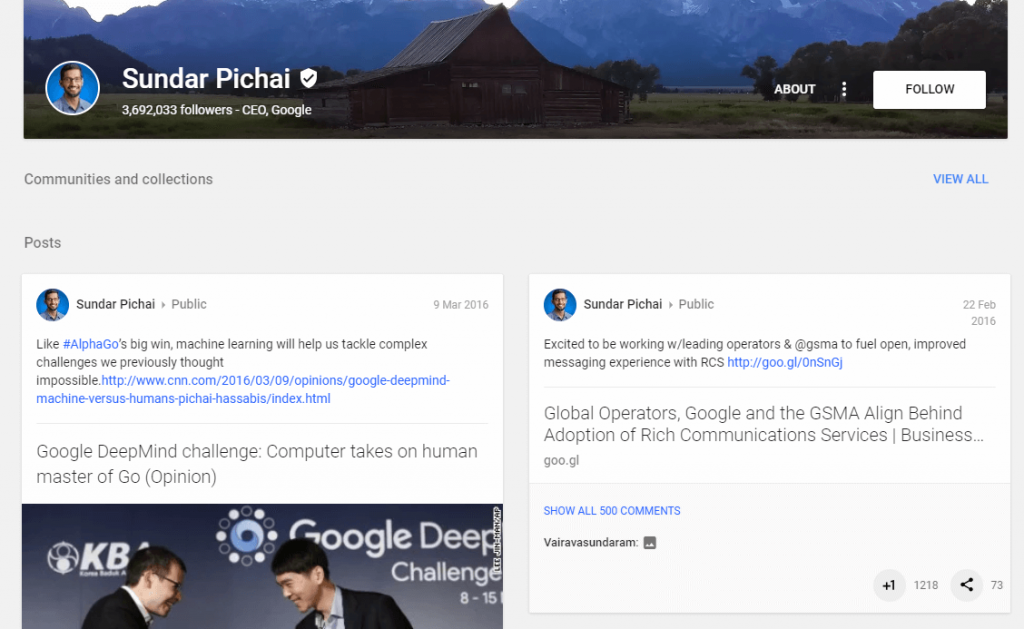
And while his Google plus account was left in ruin, his Twitter profile is flourishing. He has 3.69M followers on Google + and only 2.02M on Twitter. Almost ~260 posts and over 1k on Twitter.
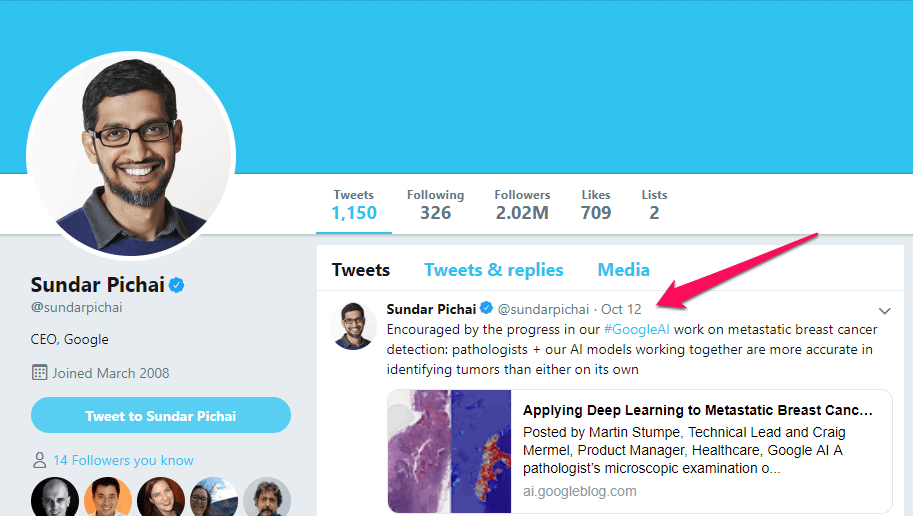
Former Executive Chairman of Google, Eric Schmidt, quit posting on 17 February 2017, long after he left Google in 2015.
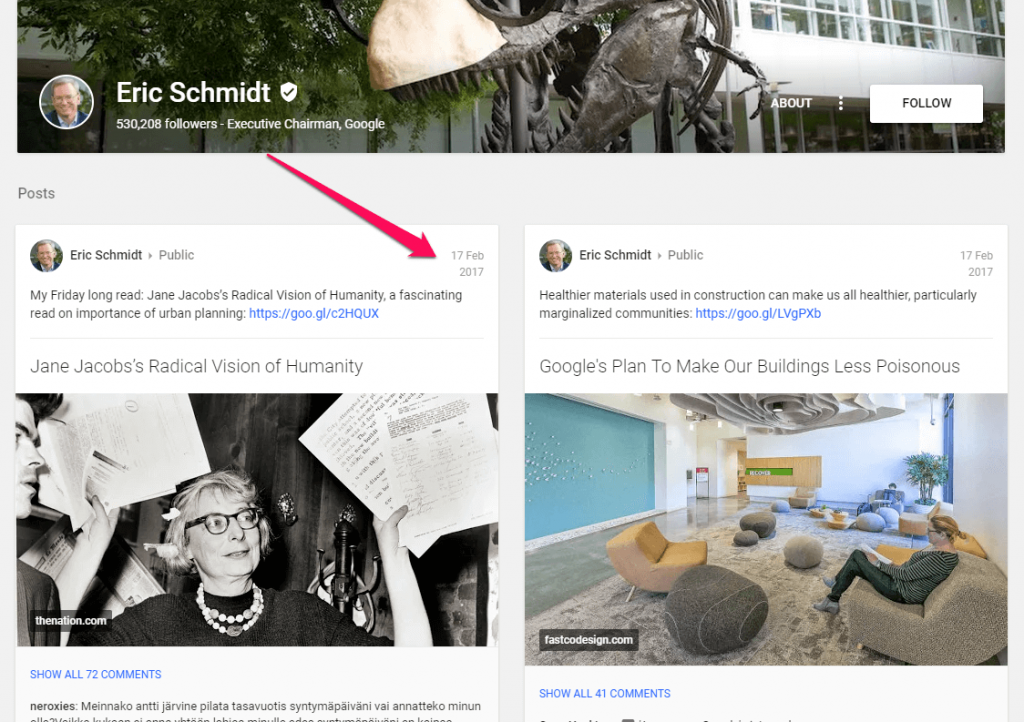
On the other hand, on Twitter the last post was on 3 October 2018. Even if he is posting less often, he’s more active on Twitter than Google +.
It’s sad to see that even Google’s management left the social network to have a free fall. The bigger shock is the fact that none of Google’s six independent board members have ever posted publicly on Google+, according to Mashable.
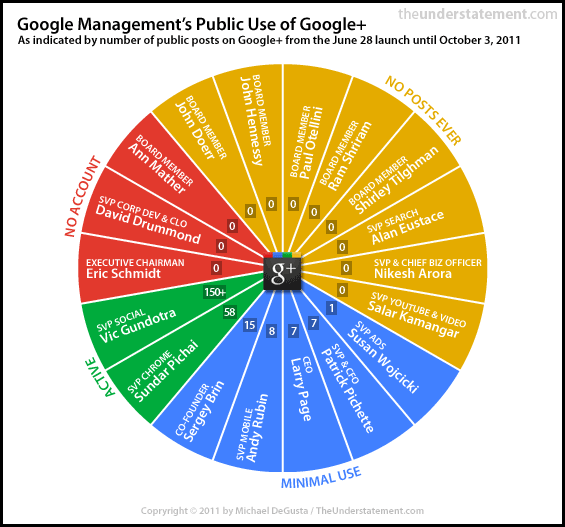
Source: mashable.com
It makes you wonder when you see these results because Google + has a high influence on business. And the fact that it wasn’t refurbished explains why it got to this point. Sadly, the data breach was inevitably in this case … So, the question that we have is “How could the decision to shut down Google + influence your business and does it affect your SEO?”
2. Will Shutting Down Google + Affect Your Business?
Probably you’re thinking:
If Google’s top representatives don’t use Google+, then why did we?
The answer is simple: because of the influence social signals might have.
We’ve shown you multiple times that social signals are very important to drive awareness and create authority for a website to push it in SERP. In 2016, we analyzed 23 million shares to see their impact on rankings. We discovered that the average Google+ shares for the 1st rank is significantly higher, so they (might) have value for pushing pages to higher positions in Google.
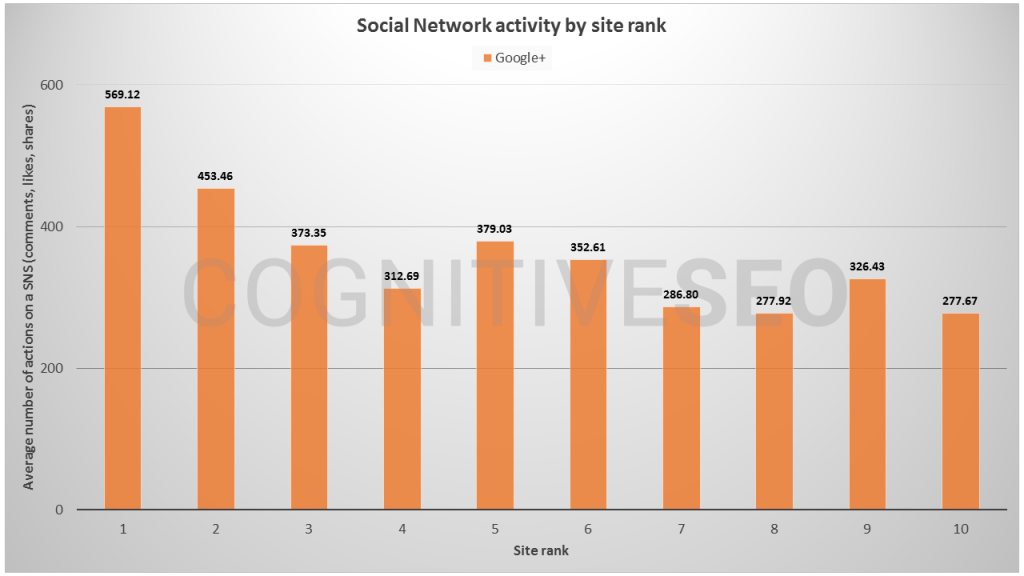
Moreover, higher rankings are correlated with Facebook, Google +, LinkedIn & Pinterest high shares altogether. Now that you are losing one link to the chain, it might affect your website. But if all websites lose the same chain, wouldn’t that make loss an equal part for all? Well, that depends. We saw that micro-content that ranks 1st is correlated with high G+ shares.
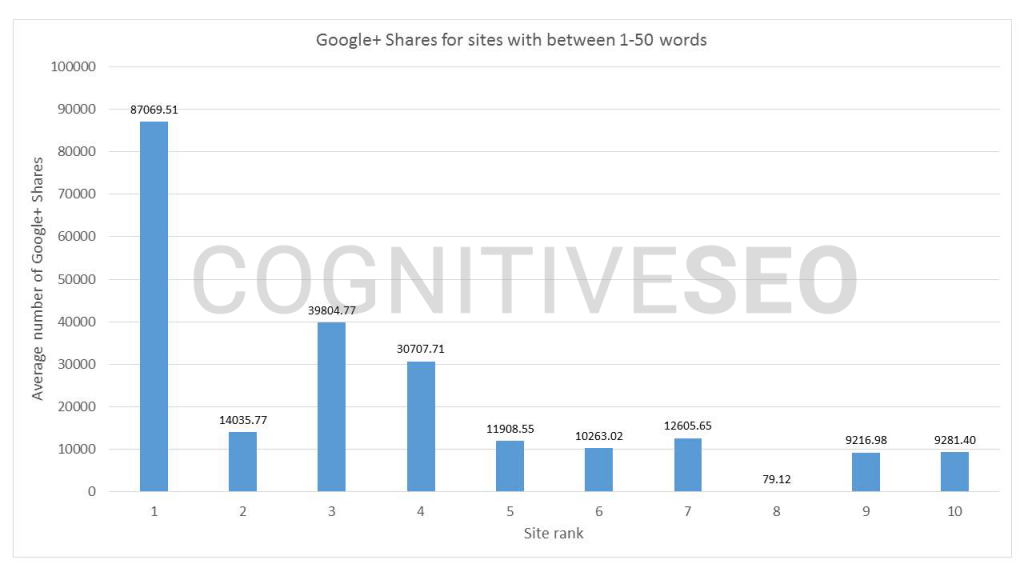
Google launched plus one button for websites in 2011. Voices were saying that it used them as ranking signals used for search quality and rankings. But Google denied the allegation and said they had never used Google+ or plus ones as a ranking signal.
Google + started as a promising project, but it had a slow death, with nothing intriguing to offer. It was a time when Google tried to make people use it and drive conversations on the social network, by highlighting Google+ content in search results and in Google News, showing you the discussions on Google+. But in the end, it was all for nothing and even made users make fun of it in the SEO community.
After a few attempts to refresh the social network, Google stopped pushing it to users and slowly lost interest in it.
The explanation comes in Google’s blog post where they made the announcement of closing the social network, they acknowledged it didn’t receive the fame despite all the efforts.
| Our engineering teams have put a lot of effort and dedication into building Google+ over the years, it has not achieved broad consumer or developer adoption, and has seen limited user interaction with apps. | |
Up to this point, we can say that if Google’s algorithms are updated properly so they don’t let G+ signals influence rankings, then any website should be affected. That would be the desired situation. And as I mentioned before, Google + accounts will disappear for all websites so it would be an equal loss. Looking at this with a critical eye, we can say that there might be some cases where some websites could encounter a slight impact. For example, for websites that used mainly G+ to promote their business.
3. What’s Next in Your Social Media Strategy
What is Google planning to do in the near future now that it has lost Google +? Should we expect to see new Google products or something similar to this one? What we know is what Google stated.
All users have time until August 2019 to save their data. So take whatever you need before summer when it will be closed indefinitely. During this time, Google said it will offer additional information to users to help them download that data or migrate it.
Google might create new products or features, but only for businesses because as they said, the main focus now is to provide enterprise facilities.
| We’ve decided to focus on our enterprise efforts and will be launching new features purpose-built for businesses. We will share more information in the coming days. | |
We’ll just have to wait to see what will happen, but one thing is clear: Google says that businesses shouldn’t suffer from this decision as they will come up with a solution.

 Site Explorer
Site Explorer Keyword tool
Keyword tool Google Algorithm Changes
Google Algorithm Changes

Such an interesting history, the evolution of Google+. You’re right, while most weren’t actively using it (to their knowledge) there are still ways that it was being integrated into our day to day. Think Google+ sign-ins and, of course, SEO.
Quick point – regarding how much time users have to download their data, as of Feb 1st, it actually has been reduced. Google now says it will start deleting content, data and files start April 2, 2019.
The latest help link from Google on how to download your own data:
https://support.google.com/plus/answer/1045788
Thanks for the update, Susan.
g mail is also shutting down?
Hi Rodney,
Inbox by Gmail is shutting down, which is another email platform from Google. Most of its features to be integrated into Gmail so there’s nothing to worry about.
It’s almost time to bid farewell to Google+, the tech giant’s social media network. In an announcement in December, the company had said that it would shut down Google + in April.
Hi Sabahat,
That’s right.